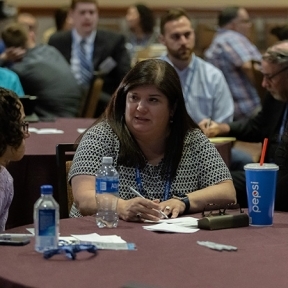
- Speakers

Thank you to all who made the 2024 ISPE Pharma 4.0™ and Annex 1 Conference such a big success!
Hear from industry leaders and regulators who will share their perspectives on the future of pharmaceuticals.
Gain actionable insights into the latest Annex 1 revisions and their application in pharmaceutical operations. These sessions will explore the intersection of regulatory frameworks such as Eudralex with cutting-edge digital transformation, robotics, and contamination control strategies.
Learn strategies for implementing the latest Annex 1 version through real-world case studies, ensuring smooth operational changes and hardware integration.
Gain insight into how 'plug and produce' principles offer opportunities for creating an integrated and interconnected facility, but also come with their challenges.
Discover how the pharmaceutical industry can ensure the delivery of safe products to patients by improving their processes, implementing Annex 1, and utilizing enhanced data management for faster product release.




In an era where technological advancements are reshaping every industry, the pharmaceutical sector is no exception. The 2024 ISPE Pharma 4.0™ and Annex 1 Conference is the gateway to understanding and leveraging digital transformation and artificial intelligence (AI) in pharmaceutical manufacturing. This year, ISPE is bringing together global thought leaders from industry stalwarts like AstraZeneca, Bayer, BioNTech, Boehringer Ingelheim, Johnson & Johnson Innovative Medicines, Merck Serono S.P.A., Novo Nordisk A/S, and Takeda Austria GmbH. They will share their invaluable insights into their digitalization journeys, offering key learnings that can be directly applied to businesses.

The pharmaceutical industry is in the middle of a transformative shift, driven by the dual forces of Pharma 4.0™ and the updated Annex 1 guidelines. These changes are introducing innovations that not only enhance the quality and safety of sterile manufacturing but also leverage new technologies to optimize efficiency and compliance. This track will bring together industry experts to discuss how Pharma 4.0 principles can support the implementation of Annex 1. From contamination control strategies to robotics and data-centric architectures, these sessions will provide attendees with actionable insights and solutions to stay ahead in an evolving regulatory landscape.

In an era where advanced therapy medicinal products (ATMPs) are revolutionizing healthcare, the 2024 ISPE Pharma 4.0™ and Annex 1 Conference, taking place 10-11 December in Rome, Italy, and virtually, will feature a track titled, "How ATMPs Manufacturing can be Supported by Annex 1 and Digital Transformation." This track will bring together experts from various fields to discuss the integration of digital technologies and regulatory frameworks in the development journey of ATMPs, as well as provide insights into real world implementation data and lessons learned. With a focus on enhancing compliance, efficiency, and accessibility, the track will feature six engaging talks and provide attendees with valuable insights into the future of this rapidly evolving sector.